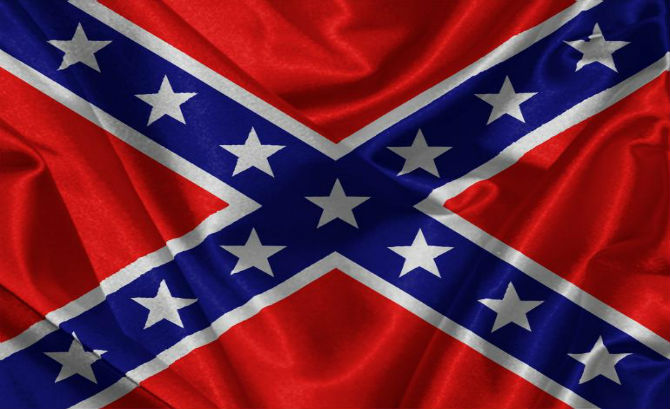Restaurants, racism and raising flags (pol318)
I hardly expected to be confronted by blatant racism when I went to dinner last week. Perhaps as a white person living in New Zealand, I have become used to the privilege of not expecting to be confronted by blatant racism anywhere. Unfortunately this reality is not shared by everyone around the world, as was highlighted earlier this year by the Black Lives Matter movement that swept through the US following the deaths of several young black people in police custody.
The racism that confronted me at dinner was explicitly tied to this movement and all it opposes. The Confederate flag is symbolic of a political movement which fought for the enslavement and oppression of African Americans, and carries notions of white supremacy akin to the Swastika. The celebration of this flag in my local restaurant is a political act; it represents the endorsement of the racist sentiments the flag carries with it, and it acts to normalise such views. Some people might argue that a flag in a restaurant is not a political statement, and even if it were it has no tangible effects on lived politics. They might argue that raising a flag is not a violent act, and that we should be more concerned with the people doing the killing. Those people would be wrong.
History has demonstrated time and again that symbols are important, and that normative values produce tangible, empirical affects. The Holocaust Museum in Washington DC chronicles the racist propaganda that saw the rise of Hitler’s Nazi Germany, and raising a flag saw Filep Karma sentenced to fifteen years imprisonment. These are examples of otherwise everyday actions that had huge political weight behind them, and they demonstrate the political importance of symbolic values. On a more abstract level, the normative assumption that we live in a state-based world in turn reinforces and creates that state-based world. The assumption that the Confederate flag and other acts of racism are normal makes them normal, and perpetuates their existence. To argue that symbolic or normative value is not also political power would be to ignore a plethora of historical evidence, as well as simple common sense. This is the very reason symbols are created, and the very reason flags exist.
The Confederate flag continues to appear today – not only in my local South-West themed restaurant, but throughout the USA on children’s clothing, on licence plates, at private properties and at war memorials. The Confederate flag is a symbol of racial discrimination, and the proliferation of this symbol reinforces the assumption that small acts of racism do not matter. This normalises racist sentiment, and has real world affects. It leads to the deaths of people like Freddie Gray, the young black man who died in police custody after being arrested for catching the eye of a police officer and running away, and Walter Scott, the unarmed black man shot by the police while running away. It leads to hate crimes like the massacre in Charleston in June that saw nine black Church-goers killed. These were real lives, and as the movement says, they matter. Those who deny that symbols like the Confederate flag contribute to the normalisation of racism, and are themselves acts of racism fail to see the stark reality of normative and symbolic value. In order to recognise the true political weight of such acts, we  must consider global politics from more varied perspectives than that of the white, middle aged man who has written the huge majority of political science and history books.
must consider global politics from more varied perspectives than that of the white, middle aged man who has written the huge majority of political science and history books.
While of course taking a flag down from a restaurant is not going to save a life directly, it will have an impact. It will make the symbol and all it stands for less normal. It may start a dialogue about the issue, as has happened as part of the Black Lives Matter movement. The reality is that if everyone questioned the continued prevalence of the Confederate flag and everything it stands for, change away from racial discrimination would progress at a much faster pace than it currently is. Excluding issues of racism and ethnic diversity from political discussion and from theories of global politics perpetuates the existence of those issues. Individuals who ignore issues of racism, whether they be political theorists, world leaders, or my local Confederate-flag loving restaurant owner, implicitly endorse those racist sentiments and perpetuate the existence of the issues themselves. Aside from the many very good reasons to take down the Confederate flag, there are very few reasons to raise the flag in the first place. A desire to pay tribute to history (especially a history so marked by violence) or create an atmosphere in a restaurant cannot outweigh the very real political consequences of this symbol.
